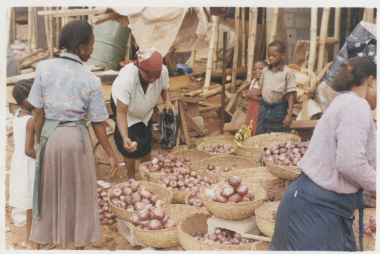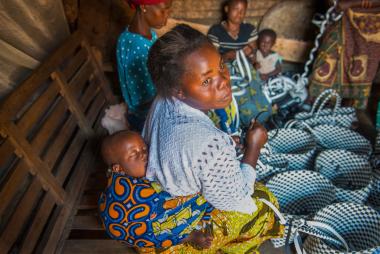When women living in impoverished, conflict-torn areas have economic participation, they often join a nation’s informal economy. Informal economies include activities or jobs that provide a source of income but are not taxed or monitored by government institutions, such as street vending, seasonal agriculture, and home-based work.
As a result, workers who participate in the informal economy lack critical job benefits, such as social security and sick leave, as well as labor protections to keep them safe, making them more vulnerable to major financial fluctuations and crises.
Women feel the effects of informal economies most - with the added burden of gender-based violence.
Women are more likely to be located lower on the hierarchy of workers and handle smaller-scale operations, like food production. Most available data indicate that globally, the estimated gender wage gap is larger among informal industries than in formal ones, meaning that for most women, working informally is an incredibly unstable engagement.
Without any social or legal protections in the workplace, women in the informal economy are also increasingly vulnerable to gender-based violence while on the job. But to earn an income for their families, many women are forced to stay silent.
Informal economies and major crises: Observations from the COVID-19 Pandemic
For both men and women in the informal economy, success is entirely dependent on their ability to work and sell; there is no sick pay, paid vacation, or social security to rely on. The worldwide COVID-19 pandemic highlights the dangers of informal economy work, and the failure of major provisions meant to lessen economic harm during the crisis.
Current recommendations of social distancing, lockdowns, and curfews, while well-intentioned, create a difficult conundrum for informal workers: staying home may keep them safe from disease and punishments from local police, but it also means they have no way to earn an income and provide for themselves and their families. And if they do fall ill, there is no reliable health insurance or affordable care. As one street vendor in Mexico said, “For us, it’s a luxury to get sick.”
Plans launched by governments with a significant informal workforce to provide grievance for lost wages almost always fail to encompass the true needs of informal workers. Even when these plans do accommodate for them, the announced grievance amount is often a fraction of the losses informal workers face. Because these workers are not counted on social security and tax payment forms, there is a major concern that most of them will not receive payment at all.
Where women make up a vast majority of the informal economy, these dangerous effects become more pronounced in a time of crisis.
Where are women working in informal economies?
In nearly all countries worldwide, women overwhelmingly provide the bulk of labor in informal economies. In sub-Saharan Africa, 74 percent of women in non-agricultural jobs are in informal employment; in south Asia, this statistic climbs as high as 80 percent.
Women are most likely to be confined to informal economy work in countries where their upward economic mobility is most limited. Nations that do not value women’s education, or where social and cultural norms relegate them as solely responsible for the home and family, see more discrepancies in gender composition and wage differences within their informal economy. Simply put, women understand the vulnerability of informal economy work, but lack the opportunity to pursue anything beyond it.
Gender-based violence in informal economies
As women who participate in informal economy production are confined to working in dangerous conditions, or in the case of street vendors, are reliant on city space for work, they become increasingly prone to gender-based violence and harassment while on the job. Without the protection of labor laws in the workplace, employers and male coworkers are more likely to commit sexual or physical violence against female workers, and less likely to be punished for doing so, because victims fear that reporting them will lead to further violence or loss of their only income.
Female street vendors around the world report that their perpetrators can even be people set in place to protect them; local security forces can specifically target and physically abuse female traders. In neighborhoods where space to sell is highly contested, women are often forced to exchange sex for permission to vend.
Women for Women International serves women living in places where many need permission from their husbands or male family members for permission to leave their homes, much less earn an income.
By connecting women to each other in business associations and savings groups, we help them build resilience to deal with crises, whether it’s COVID-19 or conflict or something else. They learn what it means when women have collective power.
For situations like the current pandemic, our country teams also have connections with local services to provide referrals to health services and resources for those experiencing gender-based violence.
Together as a global community, we can help women develop a safety net even when formal institutions fail them. Because although women bear the burden of crises and disease as the base of informal economies, they are the foundation for rebuilding communities after.


